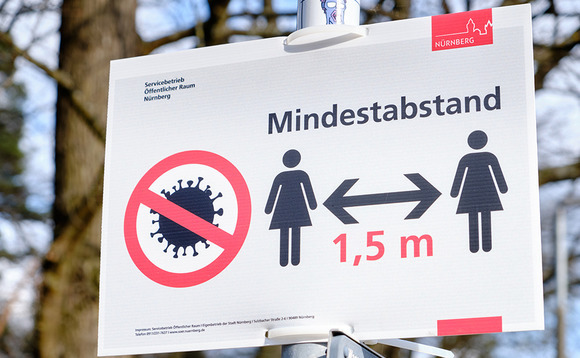
DACH holds up under pandemic pressure, but recovery doubts remain

The coronavirus crisis hit the DACH region in 2020 on the back of a record-breaking 2019 and a first quarter that saw the region's largest ever private equity buyout. H1 2020 figures for deal-doing prove the region's resilience, but how it will recover remains to be seen, writes Harriet Matthews
In H1 2020, the DACH region saw a drop in dealflow compared with the same period in 2019, as would be expected as the coronavirus pandemic took hold, but it remained limited: the region recorded 75 buyouts, compared with 88 in H1 2019. And while it could have been a foregone conclusion that Q2 2020 would show a sharp downturn in activity, this was not the case in the DACH region: Q1 2020 saw 36 buyout deals, compared with 38 deals in Q2 2020.
Aggregate deal value in the first half at first appears to have held up well in spite of the pandemic too, with buyouts totalling almost €27.9bn in H1 2020, compared with €23bn in H1 2019.
However, February 2020 saw the largest buyout ever recorded in the DACH region, when Advent International, Cinven and RAG-Stiftung acquired Thyssenkrupp Elevator for €17.2bn. Without such a large-value deal to boost the numbers, there were 74 buyouts completed, amounting to €10.7bn, giving an average value of around €143m.
This also means that aggregate buyout value fell off a cliff between Q1 2020 and Q2 2020, as activity in lockdown was mostly confined to the smaller end of the market.
David Schäfer, a partner at fund-of-funds investor Munich Private Equity Partners (MPEP), says GPs had to find a balance between portfolio triage and new investment opportunities during this period: "GPs initially focused on their existing portfolios. Those who are earlier in their cycles are mainly optimistic about finding good business models at attractive entry prices that can benefit from the anticipated economic recovery."
Leveraging potential
The fact that Germany, Austria and Switzerland did not have as sharp a lockdown as many of their European neighbours worked in the region's favour. Although DACH did not escape unscathed in terms of damage to economic growth, government support such as KfW's loan programme and the Kurzarbeit scheme in Germany, which the federal government moved quickly to introduce, have supported PE portfolio companies. KfW had received 81,359 loan applications and had made payments totalling more than €42.6bn as of 11 August 2020.
Nevertheless, the financing market did have a significant impact on PE deal-making in the first half of 2020, says Philip Cavaillès, a partner at Taylor Wessing. "PE has seen a lag compared to venture capital due to leverage financing having been impeded by generally reserved banks, although a number of mid-cap funds were quite active in the DACH market, as long as their portfolio companies were not struggling." He adds that this scenario has nevertheless presented opportunities. "Strategic buyers were more conservative as they put their focus on their own businesses and existing participations. As the order books of German companies are being increasingly filled, we are also expecting a recovery on M&A activity under certain assumptions."
Small-cap all-equity deals were more common in H1 2020, market players told Unquote; such deals were easier and faster to complete without additional financing, whereas mid-market and large-cap deals were harder to complete. A number of larger deals were put on hold as the gravity of the coronavirus pandemic became clear towards the end of Q1, including the sale of Borromin's ProFagus and Ardian's D&B Audiotechnik.
Changing gears
A number of market players maintain that it is unlikely that H1 figures reflect the extent of the damage done by the coronavirus pandemic to portfolios and M&A. Exits figures in the DACH region held up well, for example: H1 2020 saw 72 exits, while H1 2019 saw 67.
However, Michael Cziesla, a partner at law firm McDermott Will & Emery, told Unquote that he would exercise caution when reviewing the figures. "Looking at the deals that were ongoing in Q1, wherever possible, people were trying to guide them towards signing and closing, which could lead to a picture of exits not going down materially. Any seller involved in an exit right now who can't accomplish it will know that it will be a long time until they have another chance. There might have been a readiness to compromise and do the deals in Q1, and Q2 still had the Q1 wave supporting it – I would be surprised if that were the same in Q3 2020."
Looking to Q4, many market players anticipate that the financing market will gradually return, although buyers and sellers will still want to protect themselves. "There will likely be higher equity portions in PE deals that are to come now with closing accounts purchase price mechanisms, MAC clauses and, possibly, earn-outs in order to protect against impacts of a second outbreak," says Cavaillès of the prospects for the third and fourth quarters of the year. "The financing markets are not quite back, but they are getting better and we are seeing the first all-equity deals getting refinanced. Deals needing less financing went through during the peak of the crisis, but now that banks are coming back, as long as there is no second wave, leveraging may become more feasible."
Christopher Bär, a managing director at MPEP, highlights the role that fundraising dynamics will play in H2 2020 and beyond: "There are a lot of GPs delaying fundraises, who will instead be coming out in 2021. But then there will be huge competition for tickets, so some might want to go out earlier consciously. As investors, we are interested in Q2 valuations from GPs – and it's good that some expectations were reset."
Latest News
Stonehage Fleming raises USD 130m for largest fund to date, eyes 2024 programme
Sponsor acquired the public software group in July 2017 via the same-year vintage Partners Group Global Value 2017
Stonehage Fleming raises USD 130m for largest fund to date, eyes 2024 programme
Czech Republic-headquartered family office is targeting DACH and CEE region deals
Stonehage Fleming raises USD 130m for largest fund to date, eyes 2024 programme
Ex-Rocket Internet leader Bettina Curtze joins Swiss VC firm as partner and CFO
Stonehage Fleming raises USD 130m for largest fund to date, eyes 2024 programme
Estonia-registered VC could bolster LP base with fresh capital from funds-of-funds or pension funds









